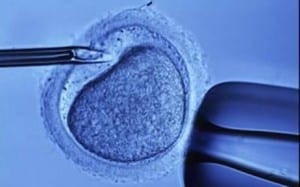
During in-vitro fertilization, the woman receives hormones that stimulate ovarian egg production. Eggs are then harvested and fertilized with the man’s sperm inside of a test tube. Once the egg is fertilized, it is then transferred into the woman’s uterus where, hopefully, a pregnancy will develop.
To date, there are no real known facts about how the hormone stimulation that takes place during in-vitro fertilization may affect the woman treated, but there is some speculation that it may create a risk for ovarian cancer. The possible link was found during a recent Dutch study conducted by Flora van Leeuwen, professor at the Netherlands Cancer Institute in Amsterdam and colleagues.
Van Leeuwen followed up on 19,146 women that had received in-vitro fertilization treatments in the Netherlands in 1983 and 1995. To develop a control group, they also compiled data on 6,006 women that had similar fertility problems but did not receive IVF treatment to conceive. Researchers were able to gather enough data to perform an ovarian cancer risk analysis on 65% of the women.
What they found was that women who had received IVF were four times more likely to suffer from “borderline ovarian tumors” (non-fatal tumors) and twice as more likely to suffer from malignant ovarian tumors than those that had not received IVF treatments.
The authors concluded that, “ovarian stimulation for IVF may increase the risk of ovarian malignancies, especially borderline tumors.” Women who have received or plan to receive IVF, however, should note that this study included a very small group of women and the authors believe that “more large cohort studies….to confirm these findings and to examine the effect of IVF treatment characteristics” are needed. They also stated that, “the absolute risk of these tumors is very low. But there is an increased risk of a borderline malignant tumor that needs surgery.”
Overall, Van Leeuwen suggests that doctors talk to women about the risks but that, since more data is needed, doctors should not overstate the risks.
Related Articles:
- Male Fertility Drops in Middle Age
- Chromosomal Testing Could Increase IVF Success Rate
- IVF Not to Blame for Giuliana Rancic’s Breast Cancer Experts Say






